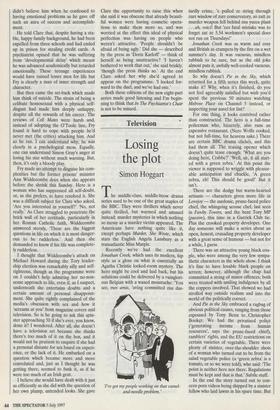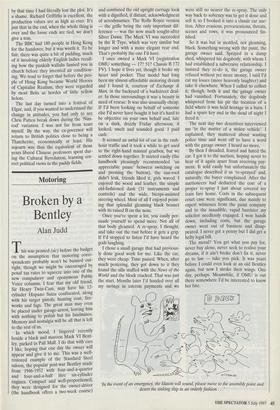Television
Losing the plot
Simon Hoggart
The middle-class, middle-brow drama series used to be one of the great staples of the BBC. They were thrillers which never quite thrilled, but warmed and amused instead; murder mysteries in which nothing so messy as a murder victim appeared. The Americans have nothing quite like it, except perhaps Murder, She Wrote, which stars the English Angela Lansbury as a transatlantic Miss Marple.
Recently we've had the excellent Jonathan Creek which uses its modern, hip style as a gloss on what is essentially an Agatha Christie locked-room mystery. The hero might be cool and laid back, but his solutions could be delivered by a vainglori- ous Belgian with a waxed moustache: 'You see, mes amis, 'aving committed ziss das- `I've got my people working on that camel- and-needle problem.' tardly crime, 'e pulled ze string through zurr window of zurr conservatory, so zatt ze murder weapon fell behind ziss yucca plant . ah, voici! But 'ees fatal mistake was to forget zat ze 5.54 workmen's special does not run on Thursdays!'
Jonathan Creek was as warm and cosy and British as crumpets by the fire on a wet summer's day. It was vacuous, mindless rubbish to be sure, but as the old joke almost puts it, awfully well-cooked vacuous, mindless rubbish.
So why doesn't Pie in the Sky, which returned for a fifth series this week, quite make it? Why, when it's finished, do you not feel agreeably satisfied but wish you'd spent the previous 50 minutes watching Melrose Place on Channel 5 instead, or inspecting your navel for lint?
For one thing, it looks contrived rather than constructed. The hero is a full-time policeman who, bizarrely, also runs an expensive restaurant. (Nero Wolfe cooked, but not full-time, for heavens sake.) There are certain BBC drama clichés, and this had them all. The teasing opener which doesn't quite tease enough: 'What are you doing here, Crabbe?"Well, sir, it all start- ed with a green zebra.' At this point the viewer is supposed to wriggle with pleasur- able anticipation and chuckle, 'A green zebra, eh! This should be good!' But it isn't.
There are the dodgy but warm-hearted artisans — characters given more life in Lovejoy — the sardonic, prune-faced police chief, the whingeing scouse chef, last seen in Fawlty Towers, and the bent Tory MP (passim), this time in a Garrick Club tie. Plus the crooked property developer. One day someone will make a series about an open, honest, crusading property developer with a great sense of humour — but not for a while, I guess.
There was an attractive young black cou- ple, who were among the very few sympa- thetic characters in the whole show. I think it's fine to have lovable black people on screen; however, although the chap had committed a string of minor offences, both were treated with smiling indulgence by all the coppers involved. That showed we had strolled way outside realism and into the world of the politically correct.
And Pie in the Sky embraced a ragbag of obvious political causes, ranging from those espoused by Tony Benn to Christopher Booker. We had the privatised police. (`generating income from human resources', says the prune-faced chief), ramblers' rights, and the EU restrictions on certain varieties of vegetable. There were plenty of sinister, over-the-shoulder shots of a woman who turned out to be from the salad vegetable police (a `green zebra' is a tomato, or so we were told), who said: 'The point is neither here nor there. Regulations must be kept and that is that.' Subtle stuff.
In the end the story turned out to con- cern porn videos being shipped by a sinister fellow who laid lawns in his spare time. But by that time I had literally lost the plot. It's a shame. Richard Griffiths is excellent, the production values are as high as ever. It's just that in the end, when the whole thing is over and the loose ends are tied, we don't give a toss.
The BBC had 180 people in Hong Kong for the handover, but it was worth it. To be fair, there was quite a bit of padding, much of it involving elderly English ladies recall- ing how the punkah wallahs fanned you in church before they invented air condition- ing. We tend to forget that before the peo- ple of Hong Kong became World Heroes of Capitalist Realism, they were regarded by most Brits as hordes of little yellow helots.
The last day turned into a festival of Elgar, and, if you wanted to understand the change in attitudes, you had only to see Chris Patten break down during the 'Nim- rod' variation. I was not far from tears myself. By the way, the ex-governor will return to British politics close to being a Thatcherite, economically at least. His sojourn was thus the equivalent of those years liberal Chinese professors spent dur- ing the Cultural Revolution, learning cor- rect political views in the paddy fields.



























































 Previous page
Previous page